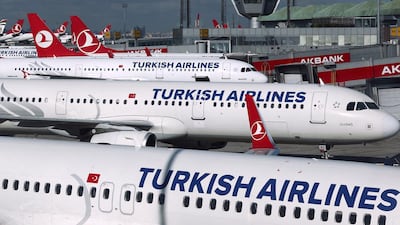DUBLIN // The chief executive of Turkish Airlines is not averse to the Airbus A380 superjumbo, but would prefer greater frequencies using smaller aircraft.
“I’m not against the machine,” said Temel Kotil in Dublin, referring to the world’s biggest aircraft, the Airbus A380, capable of carrying nearly 600 passengers.
“We are lacking the frequencies. That’s why the [Boeing] 777s and [Airbus] 330s are working everywhere,” Mr Kotil added. “I am after increasing the frequencies. Frequencies bring me more money.”
One region where the airline would like to increase frequencies is Africa. “Africa is big, we are the second biggest after Ethiopian [Airlines],” he said.
Turkish has been a maverick when it comes to expanding its coverage. The airline operates to places that most shy away from, such as Mogadishu in Somalia and Juba in South Sudan.
The Ottoman Empire super connector also flies to 113 countries, more than any other airline in the world, thanks to its strategic location at the crossroads of Europe, the Middle East and Asia.
But the Turkish carrier has its share of problems. The country is neighbour to Syria and Iraq, which has an enormous impact on its hub ambitions.
Mr Kotil said that “it is a pain” having to avoid flying over Syria’s airspace. It also costs more fuel to circumvent. “We never fly over a conflict zone, but this is life,” he said.
Turkey’s tourism industry, which is crucial to the flag carrier’s growth, has also been seriously dented by the recent spate of terrorist attacks in the capital, Ankara, and in Istanbul.
But Mr Kotil is optimistic. “Istanbul is booming. This year, Istanbul Ataturk has more passengers than Paris and Frankfurt … and it is growing.”
Mr Kotil also said that he is not worried about the increase in capacity or seats that need to be filled by airlines because of a slowdown in demand for air travel.
Globally, a softening in demand this year is causing concerns across the aviation industry.
Iata, the industry trade body that includes 260 airlines, said that air traffic grew by a mere 4.6 per cent annually in April, the slowest growth since January last year. Capacity grew by 4.9 per cent in April, meaning that carriers are flying with more empty seats. Airlines are slashing their fares to protect their market share and stay competitive.
“It’s good that the prices are going down. We love it. We lower the cost, I keep the market share,” said Mr Kotil. “Our load is between 78 and 80 per cent. All the difficult months are in the past, the coming months are [going to be] better.”
selgazzar@thenational.ae
Follow The National's Business section on Twitter

